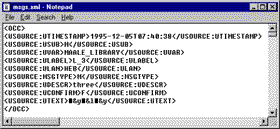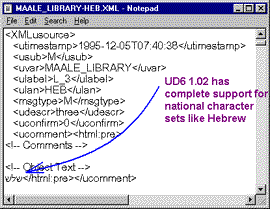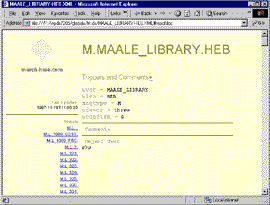| - |
UD6 is designed to work with the National Language Support of your operating system.
By default Uniface performs character set translation on all Input/Output. This often means that even though national characters, like umlauts or even Hebrew characters are represented correctly in a Uniface application, they are stored in a cryptic TRX format in the database or the XML files produced natively by Uniface (version 7.2.05 or higher export facility).
One of the main areas that this can be seen in is a Uniface message. For instance, when Uniface messages in Hebrew are exported in XML format from Uniface 7.2.05, this is the result:

This makes these XML files useless for the exchange of anything other than US-ASCII.
Using the National Language Support built into UD6/CMtool, you can obtain a more useful result:

UD6/CMtool introduced NLS in version 1.02 and is switched on by default in UD6 2.1 and higher. Support will be expanded in future releases depending on customer demand. The support in version 1.02 extends to correct stylesheet translation of the encoding, so that non US-ASCII XML can be viewed in IE5:

For many users no additional settings will be required to use NLS support with UD6/CMtool 2.1 and higher. Some additional settings may be placed in your assignment file, and the nls0 configuration file may need to be modified. This example shows the driver setting for storing Hebrew (these should be in addition to any other settings described elsewhere for USYS$UD6_PARAMS):
USYS$UD6_PARAMS=notrx,mmf binary font 56 encoding ISO-8859-8
This example shows the default settings for UD6/CMtool Driver 2.1:
USYS$UD6_PARAMS=notrx,mmf binary font 51 encoding ISO-8859-1
NOTE: You cannot use UD6/CMtool to store the UGLYPH or UCSDIA entities in XML format when ‘notrx’ is specified. If you are using UD6 Option Pack version 2.1 or higher then these entities are stored in ISAM format by default.
NOTE: The mmf binary font nn must agree with the ‘nls0’ file being used. For instance if you use nls1255 the setting should be mmf binary font 56. However if you are using the default nls0, setting mmf binary font 56 will have no effect.
The usys:/bin directory should contain several ‘nls’ files, eg: nls437. Select whichever is the correct one for your environment and rename it to nls0. The default nls0 is for CP1252, other national languages and their code page are shown below:
| Region | Code Page |
| Central Europe | CP1250 |
| Cryllic | CP1251 |
| Arabic | CP1256 |
| Greek | CP1253 |
| Hebrew | CP1255 |
NOTE: NLS support may slow the driver down. If you experience problems that you believe may be related to this then please contact March Hare support at support@march-hare.com for assistance.
NLS files that come with the driver
Included with UD6 1.02 and later are the following nls support files:
| File | Code Page | Font number | Language(s) |
| Nls0 | 51 | CP1255 | English, German, French, Italian, Spanish, Portuguese, Swedish, Icelandic, Finnish, Dutch, Danish, Faeroese, Norwegian |
| Nls1255 | 56 | CP1255 | Hebrew |
The NLS file that the UD6/CMtool Driver uses depends on the default code page for the operating system you are using. If the resulting XML files contain too many <ufont …> tags, then you may need to delete nls0 and replace it with a copy of the appropriate nls file (or write your own).
e.g.:
<ufont num="56">êñ</font> <font num="56">à</font>
Alternatively, if you have replaced nls0 and you are getting the same behavior, it could be that code page 0 is NOT the default for your operating system. You can find the default code page in use by starting the driver with USYS$UD6_PARAMS=listoptions and then viewing the message frame.
e.g.:
unicode = 0
unicode noenc = 1
codepage = 1255
locale = C
formtoolkit = 1
For more information on these settings please read the section on USYS$UD6_PARAMS .
Further Information
How the driver works with Source Code Control
Using UD6 for EDI/XML Data Interchange
Format of the files
Unicode Support in UD6/CMtool
Modifying the XML files directly
Differences between UD6/CMtool and UD7/XML-DATA and W3C XML-DATA format
Division of the entities
UD6 Overview
How to use the driver with a configuration management solution
| $Revision: 1.14 $ $Date: 2011/02/28 02:56:33 $ | [go to top] |